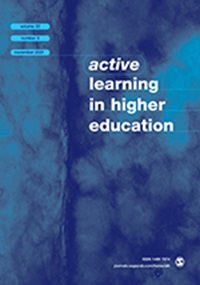The impact of feedback mode on learning gain and self-efficacy: A quasi-experimental study
IF 3.8
1区 教育学
Q1 EDUCATION & EDUCATIONAL RESEARCH
引用次数: 2
Abstract
Initiating effective feedback processes is a major goal in university teaching. However, systematic investigations of structural feedback elements making instructor feedback economic, concise, motivating and beneficial for learning are still scarce. In our study, we compare two feedback modes with respect to learning gains and changes in self-efficacy in a quasi-experimental pre-post design. Participants ( N = 75 first-year students) received either scoresheet or textual instructor feedback on four individual assignments during a seminar. Outcome variables were knowledge gain, change in self-efficacy and changes in metacognitive monitoring. After the semester, we observed substantial knowledge gains for both feedback groups with only small advantages for scoresheet feedback. In contrast, self-efficacy was relatively stable across the semester and was not influenced by feedback mode. Achievement motivation measures normative ability and challenge-mastery goal orientation did not moderate the observed relationships but influenced knowledge gain and change in self-efficacy directly. Changes in metacognitive monitoring did not depend on feedback mode. Taken together, our data suggest that scoresheet and textual feedback conveying identical feedback content have comparable effects on achievement and self-evaluation measures. For university settings, scoresheets can be recommended as parsimonious feedback tools.反馈模式对学习获得和自我效能的影响:一项准实验研究
启动有效的反馈过程是大学教学的主要目标。然而,对使教师反馈经济、简洁、激励和有益于学习的结构反馈要素的系统研究仍然很少。在我们的研究中,我们在准实验前后设计中比较了两种关于学习收获和自我效能感变化的反馈模式。参与者(N = 75名一年级学生)在研讨会期间收到了关于四项个人作业的记分表或文本教师反馈。结果变量是知识获得、自我效能感的变化和元认知监控的变化。学期结束后,我们观察到两个反馈组的知识都有了实质性的增长,而在记分表反馈方面只有很小的优势。相比之下,自我效能感在整个学期相对稳定,不受反馈模式的影响。成就动机测量规范能力和挑战掌握目标取向并没有调节观察到的关系,而是直接影响知识获得和自我效能感的变化。元认知监控的变化不依赖于反馈模式。总之,我们的数据表明,传达相同反馈内容的记分表和文本反馈对成绩和自我评价指标的影响相当。对于大学环境,分数表可以被推荐为节省的反馈工具。
本文章由计算机程序翻译,如有差异,请以英文原文为准。
求助全文
约1分钟内获得全文
求助全文
来源期刊

Active Learning in Higher Education
EDUCATION & EDUCATIONAL RESEARCH-
CiteScore
13.20
自引率
12.00%
发文量
31
期刊介绍:
Active Learning in Higher Education is an international, refereed publication for all those who teach and support learning in higher education (HE) and those who undertake or use research into effective learning, teaching and assessment in universities and colleges. The journal is devoted to publishing accounts of research covering all aspects of learning and teaching concerning adults in higher education. Non-discipline specific and non-context/country specific in nature, it comprises accounts of research across all areas of the curriculum; accounts which are relevant to faculty and others involved in learning and teaching in all disciplines, in all countries.
 求助内容:
求助内容: 应助结果提醒方式:
应助结果提醒方式:


